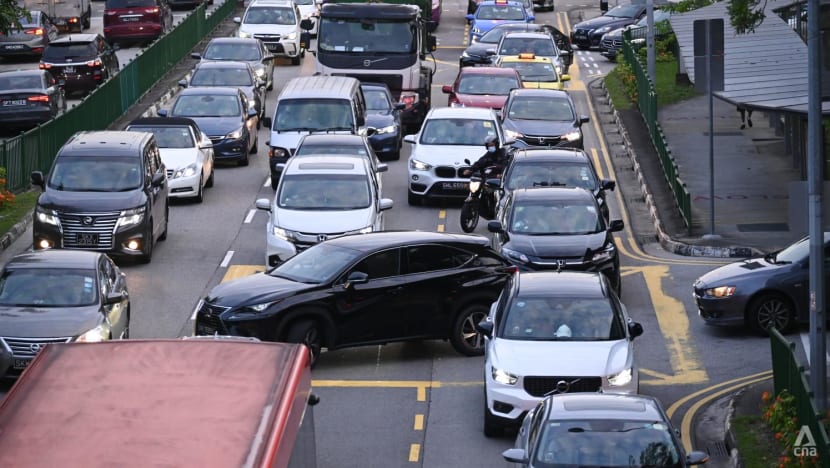Singapore passes law removing mandatory minimum penalties for first-time dangerous, careless driving offenders
Minister of State for Home Affairs Muhammad Faishal Ibrahim said that the intent of the law was "not to signal" a more lenient stance towards egregious motorists but to give courts greater discretion in determining appropriate sentences for such offenders.


This audio is generated by an AI tool.
SINGAPORE: Singapore's parliament passed a law on Tuesday (Jan 7) removing mandatory minimum sentences and the disqualification period for first-time dangerous and careless driving offenders.
Under the Road Traffic (Miscellaneous Amendments) Bill, the courts will now have greater discretion to determine appropriate sentences based on the circumstances of cases, as compared to the current situation where there are prescribed mandatory minimum sentences.
Tabling the Bill for a second reading, Minister of State for Home Affairs Muhammad Faishal Ibrahim stressed that first-time offenders will still face penalties.
These penalties will be determined based on factors including the "nature and severity of the harm caused to the victim and the level of culpability of the accused", he said.
Associate Professor Faishal added that the vast majority of criminal offences in Singapore laws do not prescribe any minimum penalty and that the courts have discretion to impose a just sentence up to the statutory prescribed maximum.
"These amendments therefore bring the approach for first-time traffic offenders closer to the norm," said Assoc Prof Faishal.
How the amendments would change current laws
Assoc Prof Faishal gave an example in parliament of how sentences are meted out to first-time offenders under the current laws.
A taxi driver, who is a first-time offender, beat a red-turning-arrow signal and collided with an oncoming motorcyclist, who was speeding across the junction on an amber signal.
The motorcyclist sustained pain, scratches and abrasions to the neck and shoulder, and received a total of 25 days of medical leave.
If the taxi driver is convicted of dangerous driving causing grievous hurt, he will be subject to a minimum of one year in jail and a minimum disqualification order from driving of eight years.
However, it can be argued that the taxi driver is "not as culpable" because the motorcyclist had been speeding across the junction on an amber signal. The accident might not have occurred if the motorcyclist had slowed down and prepared to stop when the traffic light turned amber.
The court thus should have the discretion to decide if a lower sentence would be more proportionate to the culpability of the taxi driver and the extent of injuries suffered by the motorcyclist, said Assoc Prof Faishal.
In circumstances where the victim had also contributed to the accident, the court should have the flexibility to impose penalties that are lower than the current statutory minimums.
The amendments to the laws do not necessarily mean that an offending motorist will face penalties that are lower than the current mandatory minimums. The court will ultimately decide the penalties, which may even be higher than the current statutory minimums.
But with the amendments, the court will not be constrained by the statutory minimums.
As part of the changes, the mandatory minimum sentences for repeat offenders will also be lowered.
For dangerous driving causing death, the mandatory minimum sentence will be reduced from four years to two years, while for those who cause grievous hurt, it will be cut from two years to one.
This aims to create a more "gradual progression" in sentencing between first-time and repeat offenders under the new regime, said Assoc Prof Faishal.
"The intent of these amendments is not to signal a more lenient stance towards repeat offenders," he added.
Assoc Prof Faishal pointed out that repeat offenders will still face mandatory minimum jail terms and disqualification periods. Where warranted, the courts may impose sentences higher than mandatory minimum terms.
"I want to also emphasise that there is no change to the way we are treating serious offenders, especially those who drive irresponsibly while under the influence of alcohol or drugs," said the minister of state.
"They will continue to receive severe penalties, as well as mandatory minimum penalties where grievous hurt or death is caused."
Likewise, there are also no changes to the maximum penalties for dangerous or careless driving offences, which could include lifetime imprisonment and lifetime disqualification from driving in highly egregious cases.
CONCERNS OVER REMOVING MANDATORY MINIMUM PENALTIES
MPs Dennis Tan (WP-Hougang), Yip Hon Weng (PAP-Yio Chu Kang) and Joan Pereira (PAP-Tanjong Pagar), Nominated Member of Parliament Razwana Begum and Progress Singapore Party (PSP) Non-Constituency MP Hazel Poa collectively raised concerns from the public over the removal of mandatory minimum penalties for first-time offenders.
When the Bill was announced, Mr Yip noted how some of his residents asked whether it was sending the wrong message, and if it meant that authorities were "going soft" on offenders.
"Removing mandatory minimum sentences might unintentionally be perceived as leniency, even if that is not the intent. This could undermine public trust and undo years of effort to foster safer driving habits," he said.
Mr Yip also asked if lighter sentences could "embolden risky behaviour" and lead to more repeat offenders.
Ms Pereira said the changes to the mandatory minimum sentences were "too lenient, even for first-time offenders".
"We have to remember that in these cases, lives have been or could have been endangered or lost, and the offenders did exhibit dangerous or careless driving behaviour in causing the accidents," she said. "The penalties need to be severe enough to act effectively as a meaningful deterrence."
Ms Begum suggested that it could be "appropriate" for the changes to be accompanied by a public awareness campaign.
"We need to inform the public that the primary aim of these changes is to make our roads safer," she added.
PSP's Ms Poa said that the party supported various other amendments proposed but could not support the change to remove mandatory minimum sentences and the disqualification period for first-time dangerous or careless driving offenders "at a time of rising traffic fatalities and fatal speeding accidents".
Both of PSP's NCMPs – Ms Poa and Mr Leong Mun Wai – subsequently voted against the proposed amendments and had their dissent recorded.
In her speech, Ms Poa pointed to what she called an "apparent policy U-turn" following changes made in 2019 where MHA reviewed Road Traffic Act offences.
Members of the public have expressed concern about the removal of the mandatory minimum jail term and mandatory minimum disqualification period for first-time dangerous or careless driving offenders, even in cases of reckless or dangerous driving leading to death, said NCMP Hazel Poa in Parliament on Tuesday (Jan 7). She wanted to know if there had been recent cases of dangerous driving leading to death where it is believed the mandated minimum jail term of two years was too harsh. She also urged the Government to maintain the current mandatory penalties in cases of reckless or dangerous driving leading to death.
During that review, MHA increased maximum imprisonment terms and fines, introduced the mandatory minimum sentences and minimum disqualification periods for offences causing death and grievous hurt, and instituted higher penalties for repeat and serious offenders.
Responding in his closing speech, Assoc Prof Faishal said the ministry reviews the offences and penalties in the Road Traffic Act from "time to time" and had "given some time for the laws to take their course" following the 2019 amendments.
"We now assess that amendments are necessary to recalibrate the balance between deterrence and proportionality," he said.
Ms Poa then asked what had changed since the introduction of the mandatory minimum penalties in 2019 and why judicial discretion was "not an issue" back then but is now.
Replying, Assoc Prof Faishal said that, based on the examples he had given previously, the proposed amendments provide a "better option and more flexibility" as well as avenues for a fairer sentencing regime than what is available today.
"Even though we removed the minimum element of it, the court will look at the facts of the case (and it will) enable more flexibility and a fairer outcome in the judgement," he said.
In Parliament on Tuesday (Jan 7), Minister of State for Home Affairs Muhammad Faishal Ibrahim responded to clarifications sought by members on the Road Traffic (Miscellaneous Amendments) Bill. The Bill was then passed in the House.
The minister of state also addressed concerns about the amendments sending a wrong message to offenders and the consequences of lighter sentences.
"I wish to reiterate that the intent of these amendments is not to signal a more lenient stance towards egregious motorists, nor to let them off with lighter sentences," he said.
"We will continue to punish those who exhibit irresponsible driving behaviour. The maximum penalties are stiff and remain unchanged.
"Judges will have full flexibility to decide the appropriate sentence up to the maximum sentence prescribed in law, depending on the facts of each case."
How the amendments can have no impact in some cases
In a particular case, a driver failed to stop when ordered by a traffic police officer. During the subsequent pursuit, the driver drove dangerously by changing lanes rapidly and collided with an individual at a pedestrian crossing, who sustained multiple fractures.
The driver was a first-time offender and was charged with dangerous driving causing grievous hurt.
Amendments to the current laws mean there would be no mandatory minimum imprisonment sentence or disqualification period applicable to this offender.
However, the driver had failed to heed a traffic police officer's instructions and engaged in more egregious behaviour that increased the risk of harm to the officer and other road users.
Hence, the offender can expect to be sentenced to jail and disqualified for periods that are longer than the mandatory minimum punishments for the offence.


















